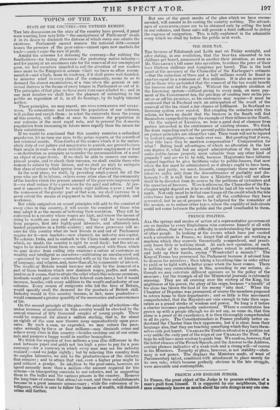THE BEER - TAX.
THE brewers of Edinburgh and Leith met on Friday sennight, and after stating, in one resolution, that the beer-tax amounted to ten shillings per barrel, announced in another their intention, as soon as Mr. GOULBURN'S bill'came into operation, to reduce the price of their beer thirteen shillings and fourpence per barrel. This is the best proof of the accuracy of the Chancellor of the Exchequer's estimate —that the reduction of three and a half millions would be found in practice equal to a remission of five millions. It is also an answer in full to those who pretended that the removal of the tax would benefit the brewers and not the people. Without the complete abolition of the Licensing system—without giving to every map, on mere pay- ment of the Government tax, the privilege of vending beer on his pre- mises or off his premises, as his customers may require—it must be confessed that in England such an anticipation of the result of the removal of the tax stood a fair chance of fidfilment. In Scotland no licensing system ever existed. But coupling the reduction with the reform, we have no doubt that the brewers in the South will find themselves compelled to copy the example of their fellows in the North. On the subject of Licences, we hear a good deal of clamour from parties interested in the continuance of existing abuses. We think the fears regarding such of the present public-houses as are conducted on proper principles are altogether vain. Their trade will not be injured by honest competition,—no trade ever was. But granting that it were, what title have they to mention .compensation ? Compensation for what ? Bating local advantages, of which no alteration in the law can deprive it, what but an unjust administration of the law could make public-house property more valuable than any other kind of property? and are we to be told, because Magistrates have hitherto leagued together to give factitious value to public-houses, that noW when the law must be administered, as it always ought to have been,. purely and justly, we must, forsooth, compensate those men whose interests suffer only from the discontinuance of partiality and dis- honesty ?—It is well that we have a Ministry which will not allow itself to be diverted from its course by the petitions of victuallers and the speeches of brewers. Were it otherwise, the Chancellor of the Ex- chequer might depend on it he would find he had all his work to begin again. Not only must he in that case forego all the credit which the late reductions have gained for him, and all the confidence they have generated, but he must prepare to be badgered for the remainder of the session, or to reduce other taxes, where the cupidity of individuals could not conic between the public and the good vouchsafed to them.


















 Previous page
Previous page